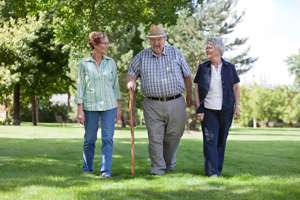Having a good social support system may help prevent the development of post-traumatic stress disorder (PTSD) in patients with heart disease, finds a study published in the American Journal of Health Promotion.
"Research shows that a cardiac patient who develops PTSD is more likely to have a second cardiac event, which is why investigating PTSD prevention helps us optimize our heart care," said Robert Eric Dinenberg, M.D., M.P.H., chief medical officer at Viridian Health Management in La Jolla, California, and an author of the study. Around 12 percent of people who have cardiovascular disease will develop PTSD.
The research, which is part of the larger UCSF Heart and Soul Study evaluating the role of psychological factors in cardiovascular disease, followed 579 people with cardiovascular disease for 5 years who did not have PTSD when they enrolled in the study.
This study found that people with a higher degree of perceived social support had a 40 percent reduction in the likelihood of developing PTSD. The authors also considered the impact of specific types of social support: "tangible" support (knowing that you can ask people for help like a ride to the doctor or moving), "appraisal" support (having people who you can talk to about problems), and "belonging" support (having people who you can go out to have a cup of coffee or to the movies with).
"It was tangible support…the material assistance that you can ask for when you need it…that was the most protective," said Dinenberg. Tangible support may give people a sense of self-efficacy and control during a chronic illness. Dinenberg added that programs that help people with chronic illness connect with other people and form support groups may also help reduce incidence of PTSD. Belongingness may reduce a person's perception of threat or help them create coping mechanisms.
"[PTSD] is common in people whose heart attack is perceived by them to be life threatening—the belief, right or wrong, that you are about to die." said Charles R. Marmar, M.D., professor and chair of the department of Psychiatry at New York University Langone Medical Center. The presence of social support plays a role in preventing PTSD at three points in time: before a traumatic event happens, while it is happening, and after it has ended, Marmar said. "They are protected when tragedy strikes them and they are less likely to develop stress anxiety and depression."
More information: Am J Health Promot. 2014 May-Jun;28(5):294-7. DOI: 10.4278/ajhp.121023-QUAN-511. Epub 2013 Aug 13. Social support may protect against development of posttraumatic stress disorder: findings from the heart and soul study. Dinenberg RE, McCaslin SE, Bates MN, Cohen BE.
Journal information: American Journal of Health Promotion
Provided by Health Behavior News Service



















